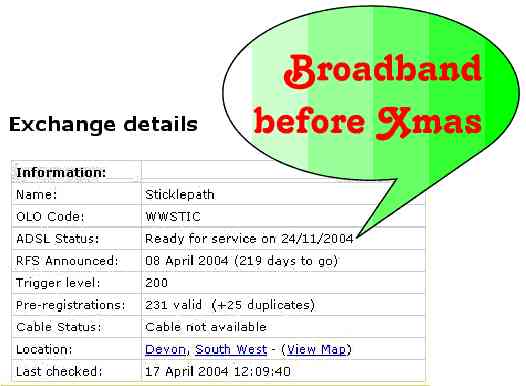Beacon Villages
cosdon.co.uk south-tawton.co.uk south-zeal.co.uk cosdon-beacon.co.uk
Belstone South Tawton South Zeal Sticklepath
Under Cosdon Beacon Dartmoor Devon UK

Archives |
|
Area
Map |
Events
Calendar |
| Area Weather | |
Alezane's
Web |
Photo
Album |
| |
|
|
|
|
News Story 1
| Broadband Update | |||||||
| The RFS (ready for service) date was announced on 8th April. I’m afraid I missed it, as the word Sticklepath was just included in a long list of named exchanges in an e-mail.
Anyway, good news! It gives us just about 7 months to start looking into how we want to implement it - how to connect : wired or wireless? which provider to use : BT or others? what to include on the connection : phone(s), PC(s), Laptop(s), PDA(s)? I will probably start by getting a few Broadband magazines and doing some learning and wishing, before I have to spend any real money. At least I hope to save, by getting rid of my second rented telephone line, now that the phone and computer will be able to work, at the same time, on one line! |
|||||||
 |
The above text was put up during the middle of last month, so many of you who only look once a month for an update, won't have seen it. As things go, this has now been superceded by another piece of news. BT is scrapping the Pre Registering scheme and all those places that got within 90% of their target will now be given a Ready for Service date Below are the full details, the first from the Samknows site and the second, the BT press release. It will be interesting how this change of strategy affects our RFS date! |
||||||
BT says goodnight to pre registration scheme BT have this morning announced that they are to scrap the pre registration scheme and replace it with a pre-ordering system. Some people have suggested that the pre registration scheme has begun running out of steam. It seems that BT have taken a similar view - "We would not be able to bring broadband to exchanges serving 99.6% of UK homes by Summer 2005 if we maintained the registration scheme". Yes, the target is 99.6% ADSL based coverage as revealed earlier last week. The remaining 0.4% will be covered with alternative technologies. Furthermore, they state that a planned rollout, rather than a triggering system, allows them to "adopt the best options and engineering solutions to deliver broadband to people connected to all these exchanges faster". The replacement for the pre-registration scheme is the pre-order scheme. At the end June this year, BT will announce a rollout programme for the remaining exchanges with triggers. These will be given RFS dates automatically. The Q&A document supplied to campaigners seems to suggest that the 150 day limit on pre-ordering broadband before the RFS date will be removed, so as to allow customers to order as soon as their date is released. The document also seems to suggest that there will still be a place for campaigners who "wish to continue the drive for broadband take up in their communities". Details of their continued involvement are not yet available. Exchanges which have triggered and are without RFS dates, and those above 90% registrations (42 exchanges), will be given RFS dates automatically over the coming weeks. These 42 exchanges which fall inside the 90% bracket will be the only ones. All the others from now on will end up in the new pre-ordering scheme. I'll try and get an official list of the exchanges above 90%, but as I said, I make the list to be 42. The remaining 565 (figure quoted from BT) exchanges without trigger level will not be included in the rollout - "BT will continue to seek to work with public sector and other organisations to help bring broadband to these areas. Possible solutions include BT’s Exchange Activate community broadband solution as well as wireless and satellite broadband." Another interesting point to make, besides the fact that people will be able to order before the 150 day barrier (which essentially destroys provisional RFS dates altogether), is that they will now be able to receive broadband ADSL on the day the exchange is activated. Until now, you often had to wait up to a couple of weeks after the RFS date itself. And here's the clincher... "As of April 27th 2004, the registration scheme is closed. Exchanges that have not triggered or are not within 10% of their trigger target will have an RFS date set and announced at the end of June." The availability checker on bt.com/broadband has already been updated to inform people of the removal of the pre registration scheme. I've had confirmation that the FastPRoBE system, which handles BT's pre registrations, has now been closed. Continued registrations via this website will not have any effect. Sorry folks! BT have kindly allowed me to republish the Q&A Word document sent to campaigners this morning. Click here to download it!. The press release can be found here. Unfortunately I will not be around a great deal today, but I will try to ensure that I keep this site up to date with the latest on the situation. Update (11am): The official list from BT detailing the 42 exchanges which have 90% or above is now available. Please click here to download it (CSV format). |
|||||||
| BT presses broadband accelerator UK to have near universal broadband coverage by summer 2005 BT today announced plans to speed up the delivery of broadband services to rural communities. These plans will make the UK a world leader for broadband availability. BT is to systematically rollout ADSL broadband to a further 1,128 exchanges by no later than summer 2005. This will help bring broadband to exchanges serving 99.6 per cent of UK homes and businesses. The new approach replaces the broadband registration trigger scheme that has helped BT match investment to demand since July 2002. "The broadband registration scheme has been a powerful tool for us to match investment to demand and its fantastic success, with the support of local campaigners, has set the way for other countries to follow. "Now, as we move into more and more rural areas and we have a clearer picture of growing demand, there are real benefits to be gained through a planned roll out. This means we can deliver broadband to far more people in a shorter timeframe. "This approach also means we can use the best engineering solution for the whole network to efficiently manage costs and future growth. "Together with our plans to extend the reach of broadband from a local exchange, this takes us significantly closer to universal availability." The rollout programme will be announced in detail by the end of June and will help BT bring forward some published broadband switch-on dates. Alison Ritchie added: "The impact that local campaigners have had has been phenomenal - their efforts have meant take-up rates on trigger exchanges have exceeded those for exchanges that were enabled before the registration scheme. These local heroes have helped change the market and this in turn has contributed to our decision to take this approach." BT Wholesale is working with service providers so people will be able to place their orders as soon as the go live date for their exchange is fixed. The certainty brought by this approach will also help service providers with their longer term business planning and marketing activities. Today's announcement will deliver broadband to every exchange in the UK except for the very smallest which between them account for less than 100,000 premises. BT will continue to seek to work in partnership with public sector and other organisations to find suitable ways of delivering broadband to these exchanges. BT has developed or is developing several products that are suitable including wireless and satellite broadband as well as the Exchange Activate community broadband solution. The innovative demand registration scheme launched in July 2002 has been a major driver in BT's rollout of broadband services with more than 880,000 individual registrations leading to the upgrade of more than 2,000 exchanges. The scheme will have taken broadband availability from 66 per cent in July 2002 to more than 90 per cent when all the triggered exchanges previously in the upgrade programme are completed. The broadband registration scheme will cease with immediate effect - those exchanges that have already triggered will have dates set as soon as possible. BT will also set dates for all exchanges within ten per cent of their triggers so that these can also go into immediate build. BT plans to announce the phasing of the rollout for the remaining trigger exchanges by the end of June 2004. BT hopes to build on its relationship with local broadband campaigners to tap the energy and commitment they have shown on availability issues and encourage them to act as champions to help their communities get the most out of the technology. |
|||||||